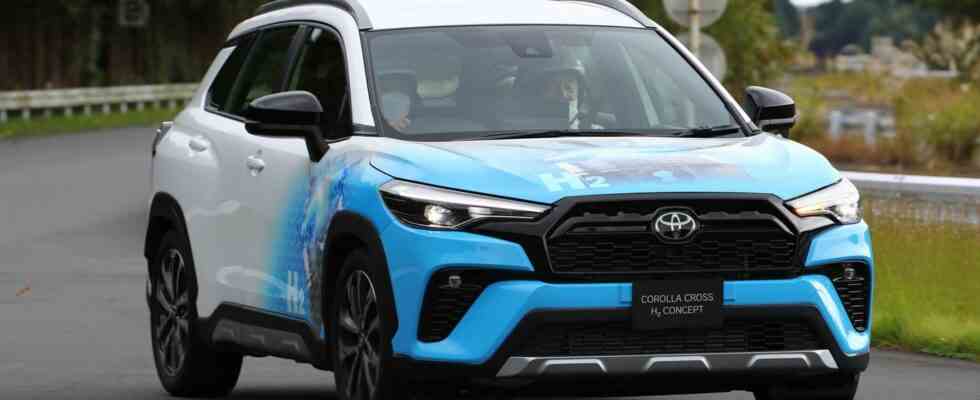Hydrogen drive without fuel cell
Climate-friendly combustion engine: Toyota is developing a prototype of a hydrogen car
The Toyota Corolla Cross H2 Concept
© Toyota Deutschland GmbH
Toyota has developed a climate-friendly car with a combustion engine. The Corolla Cross H2 Concept relies on the turbo engine of a Corolla and is powered by hydrogen. The hydrogen vehicle is said to have clear advantages over electric cars.
Vehicles with internal combustion engines using fossil fuels are to be withdrawn from sale in the future because they are considered to be harmful to the climate. Nevertheless, Toyota has developed the Corolla Cross H2 Concept, a car with an internal combustion engine, which is said to be climate-friendly. The concept vehicle presented on Tuesday is based on a hydrogen drive.
The Toyota Corolla Cross H2 Concept is a compact C-segment SUV model with a 1.6-liter turbocharged engine that burns hydrogen instead of gasoline. Toyota has installed the three-cylinder with high-pressure direct injection from the GR Corolla. The vehicle differs, for example, from the Mirai, the Japanese carmaker’s first production vehicle to date with a hydrogen drive – albeit with a fuel cell. The Mirai eventually converts hydrogen into electrical energy, powering an electric motor rather than an internal combustion engine.
Toyota states that the Corolla Cross H2 Concept can push zero-emission mobility faster. According to a press release from the company, it should also reduce refueling times and require less need for rare raw materials such as lithium and nickel than battery electric vehicles.
However, it is not yet clear whether the prototype will actually make it to the production car. The vehicle is currently being tested in northern Japan in winter conditions. Toyota expects a chance of commercialization of around 40 percent.
Toyota is testing hydrogen cars with internal combustion engines in motorsport
In motorsport, on the other hand, the car manufacturer sees greater opportunities for using hydrogen cars with combustion engines. In the Japanese Super Taikyu racing series, a hydrogen-powered GR Corolla H2 was in use for the entire time, as Toyota reports. According to the company, the test was successful. The power has been increased by 24 percent and the torque by 33 percent – the performance is comparable to that of a conventional petrol engine. In addition, the range has been improved by around 30 percent and the refueling time has been reduced from almost 5 to 1.5 minutes.
Last August, with the GR Yaris H2, Toyota sent a vehicle model with a hydrogen-powered combustion engine from its own development onto European roads for the first time. The car was tested in a demonstration run as part of the Ypres Rally in Belgium. Toyota uses the racing events to further develop its technology. The car manufacturer’s product portfolio primarily includes petrol, diesel and hybrid vehicles. Pure electric vehicles, a plug-in hybrid vehicle and the Mirai, a hydrogen car, are also available.
Hydrogen-powered cars are rare
So far, hydrogen-powered cars have hardly been able to establish themselves on the market. In the past ten years, the number of hydrogen cars registered in Germany was less than 1,000. Currently, only two car models with fuel cells are registered as standard in Germany: the Toyota Mirai and the Hyundai Nexo. One reason for the manageable number of available hydrogen cars in Germany is the very small number of hydrogen filling stations. It is currently at 95.
As an alternative to petrol and diesel-powered combustion engines, which will no longer be allowed to be sold in the EU from 2035, the current range of hydrogen-powered cars is certainly not sufficient. Instead, battery-powered electric cars seem to be winning the race against hydrogen cars, while hydrogen propulsion is increasingly being used in the commercial vehicle segment.
H2 clippers
The Return of the Hindenburg: Airship flies with explosive hydrogen
Sources: Toyota, Federal Environment Agency, H2


